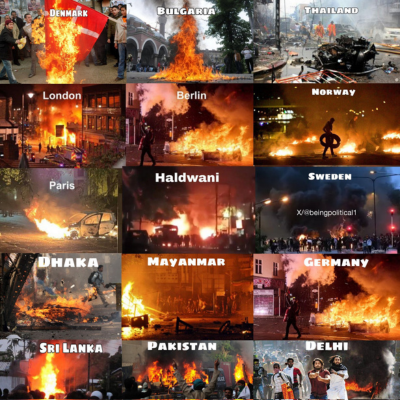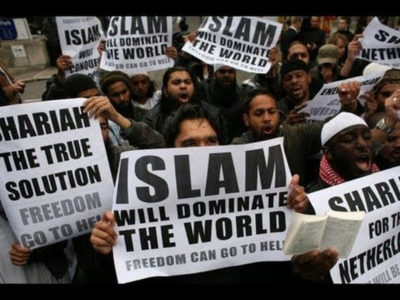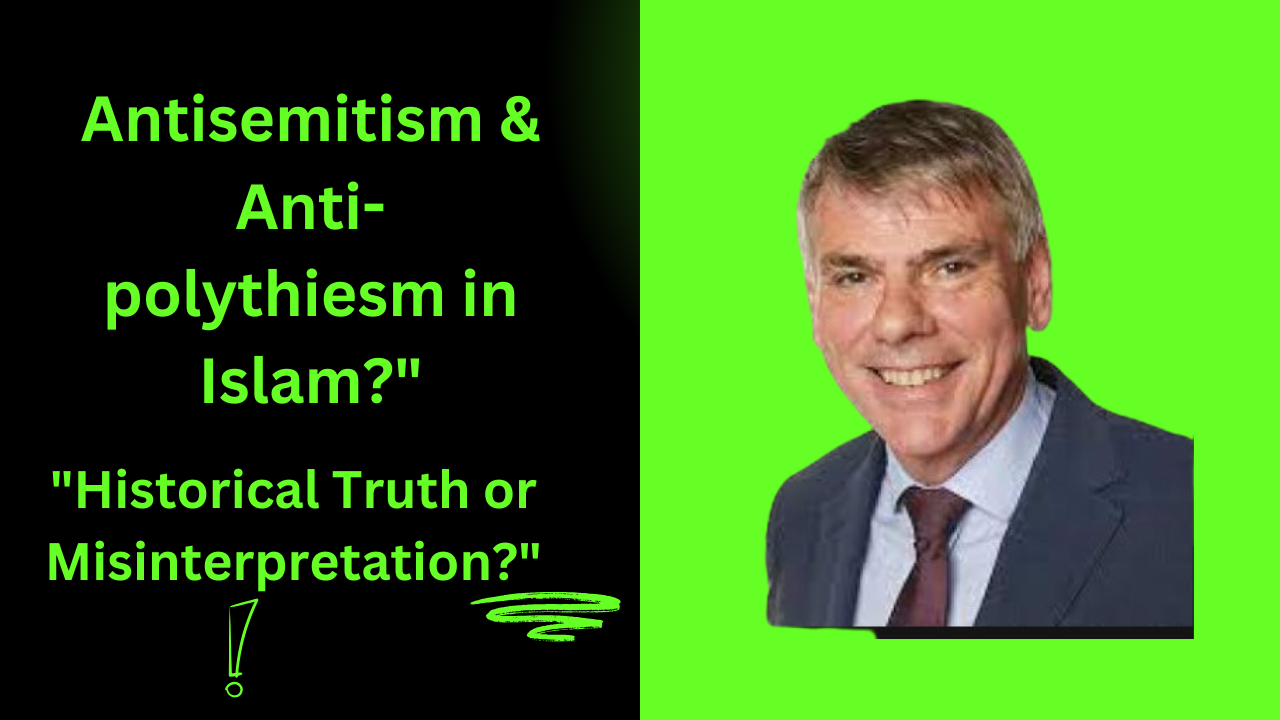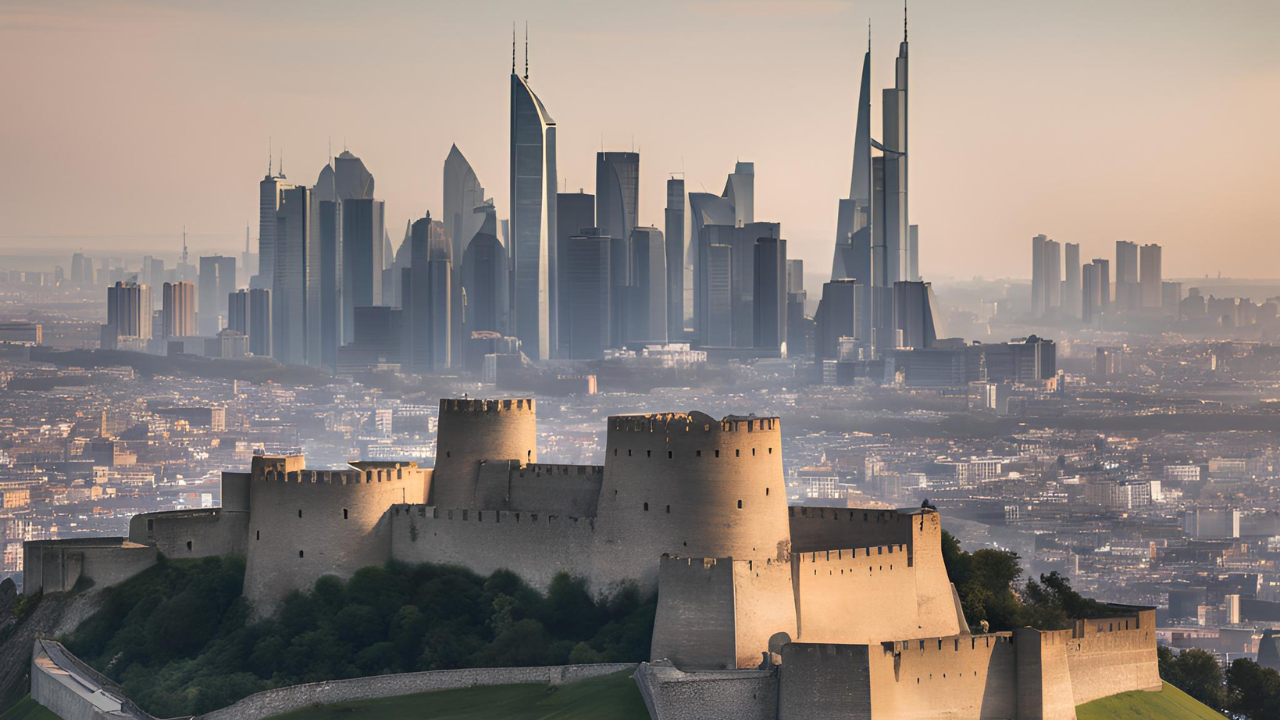
By- @JChimirie66677–
In 2006, Libya’s Colonel Gaddafi warned: There are signs that Allah will grant Islam victory in Europe – without swords, without guns, without conquests. The 50 million Muslims of Europe will turn it into a Muslim continent within a few decades.
This statement echoed the sentiments of Enoch Powell, whose infamous “Rivers of Blood” speech forewarned of social tension and violent conflict arising from unchecked immigration. Powell envisioned that large-scale immigration would risk societal divisions, fuel inter-community clashes, and potentially erode the social cohesion of British society. As he stated: As I look ahead, I am filled with foreboding; like the Roman, I seem to see ‘the River Tiber foaming with much blood.
Today, events across Europe, such as last night’s vicious attack on innocent Jews in Amsterdam, raise questions about whether these warnings have come to fruition. In Britain and across Europe, radical Islam confronts Christians and Jews with acts of aggression that impose an ideology steeped in violence and hatred. The emergence of radical Islam in the UK has its roots in a socially constructed environment organized by fundamentalist networks.
Since the late 1980s, Islamic preachers from the Middle East have mobilized segments of the Muslim community, embedding them within a fundamentalist movement aimed at re-establishing an Islamic Caliphate. Followers within this movement are encouraged to adopt extremist narratives that promote violent resistance against Western society, portraying jihad and, at times, even terrorism, as legitimate means to challenge perceived interference in Muslim lands.
This movement’s structure encourages specific roles based on age, experience, and religiosity, from recruitment to preaching, fundraising, and facilitating jihad. Through constant socialization within this extremist environment, a minority of adherents normalize terrorism, viewing suicide bombing and other violent acts as a means of supporting ISIS or similar groups.
In recent years, Powell’s forewarnings of re-social division are also evident in the segregation in many of Britain’s cities, the rise of identity politics and leftist progressives, and the strains on public services and housing that have emerged from rapid, mass immigration. With growing identity-based divides, some communities feel they’re increasingly set apart from mainstream society, which has complicated the efforts to achieve cohesive multiculturalism. Meanwhile, political debate surrounding immigration and integration often remains heated, but within a framework limited by what some see as overly cautious political correctness.
The current global landscape adds to this tension. With the war in Ukraine and ongoing conflict in the Middle East, there’s a real danger that overseas conflicts will spill over into Britain’s and Europe’s multicultural neighborhoods. In this environment, many in Britain feel a justifiable fear—not of Islam itself, but of its extremist elements. This is a fear of ideologies that promote hatred and violence, not a general antipathy toward Muslims or Islamic traditions, and the government is wrong to characterize it as Islamophobia.
Reflecting on Gaddafi’s prediction and Powell’s warning, the current trajectory raises a disquieting question: are we witnessing these prophecies unfold in the form of deepening societal rifts and rising extremism on British and European soil? These ideological and social conflicts may indeed turn our streets into battlegrounds, where clashes are fought not between nations but within our own communities.
पूर्व चेतावनी और दरारें: ब्रिटेन और यूरोप में उग्रवाद और सामाजिक विभाजन की बढ़ती लहर
2006 में, लीबिया के कर्नल गद्दाफी ने चेतावनी दी थी:
ऐसे संकेत हैं कि अल्लाह यूरोप में इस्लाम को जीत दिलाएगा – बिना तलवारों के, बिना बंदूकों के, बिना विजय के। यूरोप के 50 मिलियन मुसलमान कुछ दशकों के भीतर इसे मुस्लिम महाद्वीप में बदल देंगे।
यह कथन हनोक पॉवेल की भावनाओं को प्रतिध्वनित करता है, जिनके कुख्यात “खून की नदियाँ” भाषण ने अनियंत्रित आप्रवासन से उत्पन्न सामाजिक तनाव और हिंसक संघर्ष की चेतावनी दी थी। पॉवेल ने कल्पना की थी कि बड़े पैमाने पर आप्रवासन सामाजिक विभाजन का जोखिम उठाएगा, अंतर-समुदाय संघर्षों को बढ़ावा देगा, और संभावित रूप से ब्रिटिश समाज के सामाजिक सामंजस्य को नष्ट कर देगा। जैसा कि उन्होंने कहा:
जब मैं आगे देखता हूँ, तो मैं पूर्वाभास से भर जाता हूँ; रोमन की तरह, मुझे लगता है कि ‘तिबर नदी बहुत खून से लथपथ है।
आज, यूरोप भर में घटनाएँ, जैसे कि एम्स्टर्डम में कल रात निर्दोष यहूदियों पर हुआ क्रूर हमला, इस बारे में सवाल उठाता है कि क्या ये चेतावनियाँ सच साबित हुई हैं। ब्रिटेन और पूरे यूरोप में, कट्टरपंथी इस्लाम ईसाइयों और यहूदियों का सामना आक्रामक कृत्यों से करता है जो हिंसा और घृणा में डूबी विचारधारा को थोपते हैं। ब्रिटेन में कट्टरपंथी इस्लाम के उदय की जड़ें कट्टरपंथी नेटवर्क द्वारा संगठित सामाजिक रूप से निर्मित वातावरण में हैं।
1980 के दशक के उत्तरार्ध से, मध्य पूर्व के इस्लामी प्रचारकों ने मुस्लिम समुदाय के कुछ हिस्सों को संगठित किया है, उन्हें एक कट्टरपंथी आंदोलन के भीतर शामिल किया है जिसका उद्देश्य इस्लामी खिलाफत को फिर से स्थापित करना है। इस आंदोलन के अनुयायियों को चरमपंथी आख्यानों को अपनाने के लिए प्रोत्साहित किया जाता है जो पश्चिमी समाज के खिलाफ हिंसक प्रतिरोध को बढ़ावा देते हैं, जिहाद और कभी-कभी आतंकवाद को मुस्लिम भूमि में कथित हस्तक्षेप को चुनौती देने के वैध साधन के रूप में चित्रित करते हैं।
इस आंदोलन की संरचना उम्र, अनुभव और धार्मिकता के आधार पर विशिष्ट भूमिकाओं को प्रोत्साहित करती है, जिसमें भर्ती से लेकर उपदेश, धन उगाहना और जिहाद को सुविधाजनक बनाना शामिल है। इस चरमपंथी माहौल में निरंतर समाजीकरण के माध्यम से, अनुयायियों का एक अल्पसंख्यक आतंकवाद को सामान्य बनाता है, आत्मघाती बम विस्फोट और अन्य हिंसक कृत्यों को ISIS या इसी तरह के समूहों का समर्थन करने के साधन के रूप में देखता है।
हाल के वर्षों में, पॉवेल की चेतावनियाँ पुनः सामाजिक विभाजन को ब्रिटेन के कई शहरों में अलगाव, पहचान की राजनीति और वामपंथी प्रगतिवादियों के उदय और सार्वजनिक सेवाओं और आवास पर तनाव के रूप में भी स्पष्ट हैं, जो तेजी से बड़े पैमाने पर आप्रवासन से उभरे हैं। पहचान-आधारित विभाजन बढ़ने के साथ, कुछ समुदायों को लगता है कि वे मुख्यधारा के समाज से अलग हो रहे हैं, जिसने एकजुट बहुसंस्कृतिवाद को प्राप्त करने के प्रयासों को जटिल बना दिया है। इस बीच, आप्रवासन और एकीकरण के आसपास की राजनीतिक बहस अक्सर गर्म रहती है, लेकिन कुछ लोगों द्वारा अत्यधिक सतर्क राजनीतिक शुद्धता के रूप में देखे जाने वाले ढांचे के भीतर।
वर्तमान वैश्विक परिदृश्य इस तनाव को बढ़ाता है। यूक्रेन में युद्ध और मध्य पूर्व में चल रहे संघर्ष के साथ, एक वास्तविक खतरा है कि विदेशी संघर्ष ब्रिटेन और यूरोप के बहुसांस्कृतिक पड़ोस में फैल जाएंगे। इस माहौल में, ब्रिटेन में कई लोग एक उचित डर महसूस करते हैं – इस्लाम से नहीं, बल्कि इसके चरमपंथी तत्वों से। यह उन विचारधाराओं का डर है जो नफरत और हिंसा को बढ़ावा देती हैं, मुसलमानों या इस्लामी परंपराओं के प्रति सामान्य घृणा नहीं है, और सरकार द्वारा इसे इस्लामोफोबिया के रूप में वर्णित करना गलत है। गद्दाफी की भविष्यवाणी और पॉवेल की चेतावनी पर विचार करते हुए, वर्तमान प्रक्षेपवक्र एक बेचैन करने वाला सवाल उठाता है: क्या हम इन भविष्यवाणियों को ब्रिटिश और यूरोपीय धरती पर गहराते सामाजिक दरार और बढ़ते उग्रवाद के रूप में सामने आते हुए देख रहे हैं? ये वैचारिक और सामाजिक संघर्ष वास्तव में हमारी सड़कों को युद्ध के मैदानों में बदल सकते हैं, जहाँ संघर्ष राष्ट्रों के बीच नहीं बल्कि हमारे अपने समुदायों के भीतर लड़े जाते हैं।


